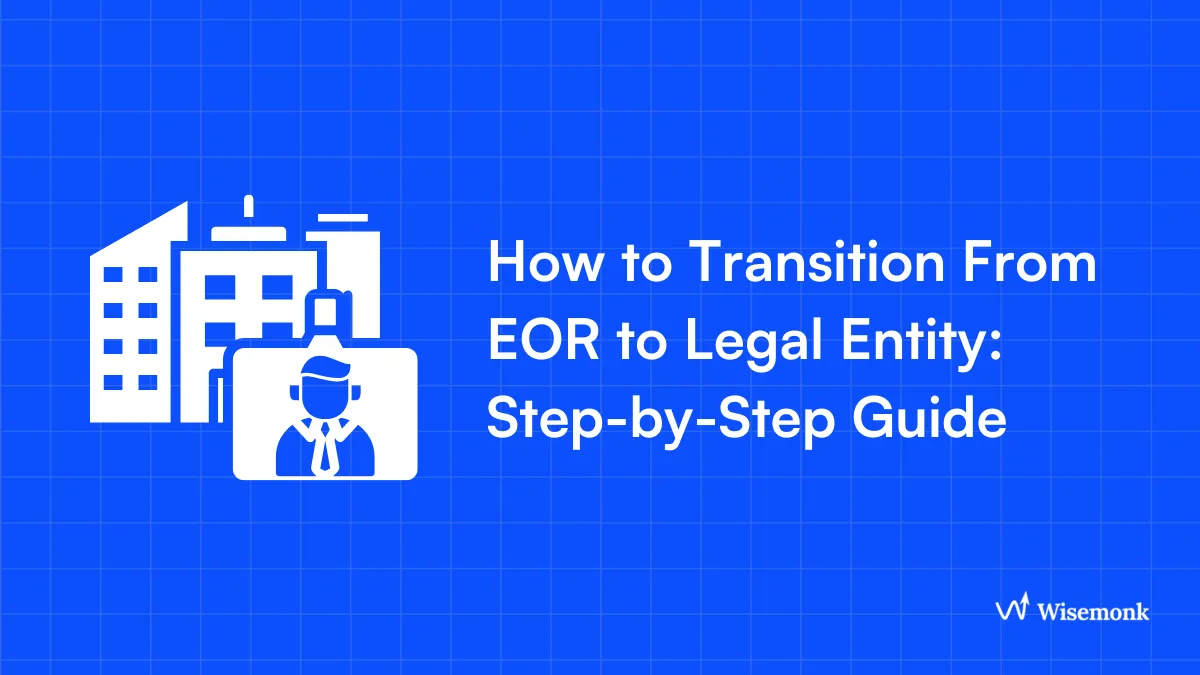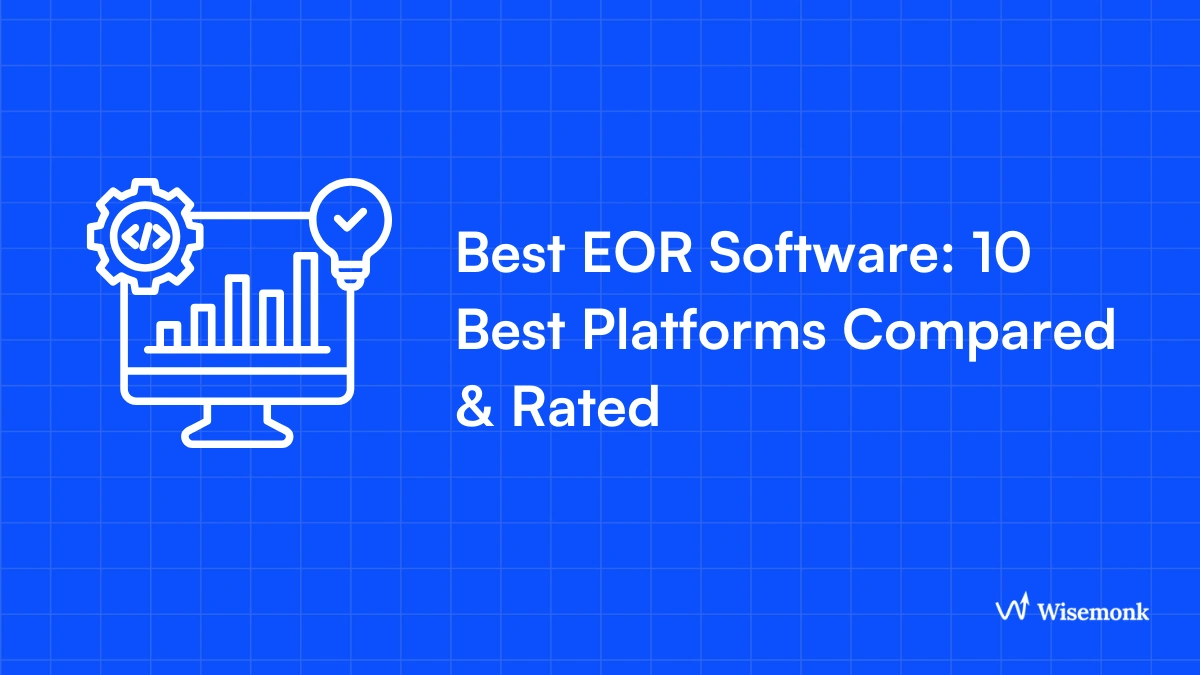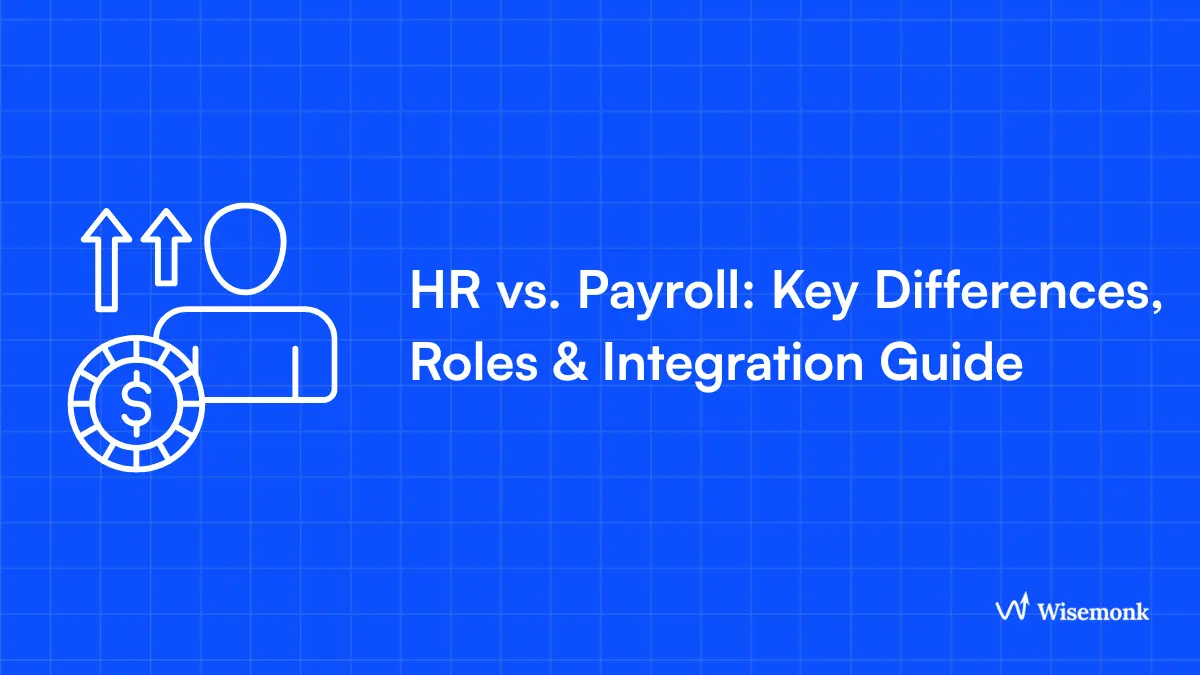- A 1099 contractor is self-employed with no state registration. You carry full personal liability and pay 15.3% self-employment tax on net income. Easy to start, but your personal assets aren’t protected.
- An LLC is a state-registered business that separates personal and business assets. It limits liability, improves credibility with clients, and allows tax flexibility, including S-Corp election as income grows.
- Choose 1099 if you have low income, minimal risk, and want simplicity. Form an LLC when net income exceeds $50K, you face liability exposure, or you plan to hire and scale operations.
- LLCs taxed as sole proprietorships or partnerships receive 1099-NEC forms. LLCs that elect S-Corp or C-Corp taxation are treated as corporations and are generally exempt from 1099 reporting.
Not sure whether to operate as a 1099 contractor or form an LLC? Talk to us today.
Discover how Wisemonk creates impactful and reliable content.
Should I stay as an independent contractor or form an LLC?
We have seen this question come up consistently with freelancers, solopreneurs, and US companies hiring self-employed talent.
The 1099 setup works at first. No registration, no fees, no paperwork. You get paid, you file taxes, you move on. Until your income grows, a client demands a registered entity, or one lawsuit puts your personal assets on the line.
The problem is not understanding the difference between a 1099 contractor and an LLC. It is assuming the structure you start with is the structure that will protect you as your business scales.
This article breaks down where that assumption fails, covering how they compare on liability, taxes, and credibility, when to switch, and the exact steps to form an LLC as an independent contractor.
What is a 1099 independent contractor?[toc=1099 Contractor]
1099 contractors are individuals who the IRS classifies as self-employed workers providing services to clients under a contract. The IRS determines this status based on how much control the hiring business has over the worker's methods, schedule, and deliverables.
In simple terms, a 1099 contractor is someone who works for themselves. They are not on any company's payroll, do not receive employee benefits, and are fully responsible for managing their own taxes and business expenses.
Unlike employees who receive W-2 forms, 1099 contractors receive a Form 1099-NEC from every client that pays them $600 or more in a tax year. They must file their own income tax and self-employment tax, which covers both Social Security and Medicare contributions.
1099 contractors are also required to make quarterly estimated tax payments to the IRS using Form 1040-ES. Failing to do so can result in penalties. They bear full personal liability for any debts, lawsuits, or damages arising from their work.
What are the pros and cons of being a 1099 independent contractor?
From what we have seen helping US companies onboard and manage contractors through our contractor compliance and payroll solutions, here are the key pros and cons of operating as a 1099 independent contractor.
If you want to understand the broader distinction between contractors and full-time employees, check out our guide on contractor vs employees: explained.
What is an LLC and how does it work?[toc=Limited Liability Company]
An LLC, or Limited Liability Company, is a business structure that separates the owner's personal assets from the business. If the company faces lawsuits or debt, the owner's personal savings, home, and property are generally protected.
LLCs offer flexible tax treatment. By default, the IRS taxes a single-member LLC as a disregarded entity and a multi-member LLC as a partnership. Beyond defaults, LLCs can also elect S-Corp or C-Corp taxation.
For all LLC types except C-Corps, earnings and losses pass through to the owners' personal tax returns. This avoids double taxation and is one of the most significant financial advantages of the LLC structure.
Single-member vs multi-member LLC
A single-member LLC has one owner and reports all income on Schedule C of their personal tax return. A multi-member LLC has two or more owners, files Form 1065, and issues each member a Schedule K-1.
The key operational difference is governance. Single-member LLCs have simpler decision-making, while multi-member LLCs require an operating agreement outlining profit distribution, voting rights, and member responsibilities. Both offer the same liability protection.
How does an LLC protect its owners?
An LLC creates a legal wall between the business and its owners. Creditors can only pursue the LLC's assets, not the owner's personal bank accounts, home, or car. This protection holds as long as personal and business finances remain properly separated.
However, an LLC does not shield owners from personal wrongdoing like malpractice, negligence, or fraud. For the strongest protection, pairing an LLC with business liability insurance is recommended.
Now that you understand what a 1099 contractor and an LLC are individually, let's break down how they compare across the factors that matter most, liability, taxes, structure, and credibility.
What are the key differences between a 1099 contractor and an LLC?[toc=1099 Contractor vs. LLC]
Having worked with hundreds of US companies hiring independent contractors through our EOR and contractor management platform, we have seen firsthand how the choice between a 1099 contractor and an LLC impacts liability protection, taxes, and long-term business growth.
Here is how the two compare across the factors that matter most.
Understanding these key differences between an independent contractor vs LLC is just the first step. Next, let's look at the specific tax advantages and business growth benefits that make forming an LLC worth considering for most independent contractors.
What are the benefits of forming an LLC as an independent contractor?[toc=Benefits of Forming LLC]
Beyond the structural differences, the real question most independent contractors ask is whether forming an LLC is actually worth it.
Based on what we have seen working with US companies managing contractors globally, the benefits fall into two clear categories, tax advantages and business growth potential.
What tax advantages does an LLC offer over a 1099 setup?
The tax difference between staying as a 1099 contractor and forming an LLC is where most independent contractors see the biggest financial impact.
How does an LLC support long-term business growth?
When it comes to scaling beyond solo freelancing, the LLC structure gives independent contractors a clear advantage in credibility, capital, and operational flexibility.
If you are asking yourself, "do I need an LLC as an independent contractor," "can an independent contractor be an LLC," or "can an LLC be an independent contractor", the next section breaks down the exact scenarios where each option makes the most sense.
When should you choose a 1099 vs an LLC?[toc=Which Should You Choose]
There is no one-size-fits-all answer to the independent contractor vs LLC debate. The right choice depends on your income level, risk exposure, long-term business goals, and how much administrative complexity you are willing to manage. Here is how to decide.
What are the ideal scenarios for staying 1099?
From our experience helping US companies structure contractor engagements compliantly, staying as a 1099 independent contractor makes more sense in these scenarios.
.webp)
- You are just starting your own business or running a side hustle with minimal revenue
- Your annual business income is under $30K–$50K and does not justify LLC formation costs or operating agreement requirements
- You work on short-term projects providing specialized services with low liability exposure
- You want zero admin overhead, no filing fees, no annual reports, no payroll taxes to manage
- Your potential clients do not require you to operate as a registered business entity
- You are self-employed and prefer filing taxes simply through Schedule C on your personal tax return
Most independent contractors in the early stages of their career find that the simplicity of a 1099 setup makes more sense than taking on the legal requirements of a formal LLC structure.
If you are also trying to understand the difference between tax forms used for hiring independent contractors and regular employees, check out our guide on W9 vs. W2: Which IRS Form Should You Use? (2026 Guide).
What are the ideal scenarios for forming an LLC?
Based on the patterns we have seen across hundreds of contractor relationships managed through our platform, here is when forming an LLC becomes the smarter move for small business owners.
.webp)
- Your net business income consistently exceeds $50K and you want to reduce self-employment tax on Social Security and Medicare taxes through S-Corp election
- You work with enterprise clients or government contracts that require a separate legal entity to engage
- Your services carry liability risk, consulting, professional advice, physical work, or high-value deliverables, and you need liability protection for your personal assets
- You want to separate personal finances from business debts and business liabilities so you are not personally liable
- You plan to hire subcontractors, add more than one owner, or scale business operations in the near future
- You want to build business credibility and qualify for business loans independently from your personal accounts
For sole proprietors wondering whether it is time to transition to an LLC structure, the general rule is simple, when the risk to your personal assets and the tax savings from an S-Corp election outweigh the formation and compliance costs, it makes more sense to form an LLC.
Now that you know which scenario fits your situation, the next step is understanding exactly how to set up an LLC as a contractor, from registration to tax compliance.
What are the steps to form an LLC as a contractor?[toc=Steps to Form LLC]
Forming an LLC as an independent contractor is not as complex as it seems. The process involves state-level registration, federal tax setup, and ongoing compliance. Here is a step-by-step breakdown.
What are the registration requirements?
The registration requirements to establish an LLC may vary from state to state, but most independent contractors will follow these core steps.
- Choose a unique business name: make sure it is not already trademarked by checking with the United States Patent and Trademark Office. Avoid restricted terms like "bank" or "insurance" unless pre-approved.
- Appoint a registered agent: this is the person or service responsible for receiving legal documents on the LLC's behalf. The agent must be over 18 and a resident of the state where the LLC is registered.
- File Articles of Organization: submit this document to your state's Secretary of State office. It includes the LLC's name, address, purpose, management structure, registered agent details, and organizer signatures. Filing fees range from $35 to $500 depending on the state.
- Draft an operating agreement: this internal document outlines profit distribution, voting rights, member responsibilities, and business operations guidelines. While not required in every state, it is strongly recommended.
- Obtain an employer identification number (EIN): apply for free on the IRS website. The EIN identifies your LLC for tax purposes and is required to open a business bank account, even for a single-member LLC.
- Open a separate business bank account: this is critical for maintaining the liability protection your LLC provides. Commingling personal and business finances can pierce the corporate veil.
What legal and tax compliance do you need to follow?
Once your LLC is registered, ongoing compliance is essential to maintain your limited liability protection and avoid penalties.
- File annual or biennial reports with your state as required. Fees and deadlines vary by state.
- Obtain all required licenses and permits to operate your business legally in your chosen state.
- Pay taxes based on your LLC's tax classification: file Schedule C for a single-member LLC, Form 1065 for a multi-member LLC, or Form 1120-S if you have elected S-Corp status.
- Make quarterly estimated tax payments to the IRS using Form 1040-ES to avoid year-end penalties.
- Maintain meticulous record-keeping: keep business receipts, invoices, contracts, and financial statements organized and separate from personal finances.
- Review and update your operating agreement regularly as your business grows or membership changes.
Does an LLC receive 1099 forms?
Whether an LLC receives a 1099 depends on how it is classified for tax purposes.
- Single-member LLCs taxed as a disregarded entity or sole proprietorship, yes, clients must issue a 1099-NEC for payments of $600 or more in a tax year.
- Multi-member LLCs taxed as a partnership, yes, they also receive 1099-NEC forms from clients.
- LLCs that have elected S-Corp or C-Corp taxation, generally no. They are treated as corporations for tax purposes, and corporations are typically exempt from 1099 reporting.
The simple rule, if your LLC is taxed as a pass-through entity, expect to receive 1099 forms. If it is taxed as a corporation, you generally will not.
How does Wisemonk help you manage independent contractors and LLCs?[toc=How Wisemonk Helps]
Wisemonk is a trusted Employer of Record (EOR) that helps US companies hire, pay, and manage independent contractors and employees compliantly, without setting up a local entity.
Whether you are engaging 1099 contractors or working with LLC-registered vendors, our specialists handle the compliance, payroll, and tax complexity so you can focus on building your team.
Here is how we support your business:
- Accurate contractor classification: We help classify workers correctly as independent contractors or employees, ensuring compliant engagement and avoiding costly misclassification penalties from the IRS.
- 1099 reporting and tax compliance: We manage 1099-NEC filing, tax withholding where applicable, and ensure proper documentation whether your contractors operate as sole proprietors or through an LLC.
- Global contractor payroll: We handle payments to independent contractors across borders, managing self-employment tax obligations, FICA considerations, and multi-currency payroll with precision.
- Ongoing compliance support: Tax laws and contractor regulations change frequently. We provide continuous compliance monitoring to keep your business aligned with current IRS rules and state-level requirements.
We have successfully integrated over 2,000 employees into global teams and earned the trust of more than 300 companies worldwide. While we are the leading EOR in India, we are also expanding rapidly across the US, UK, and other key markets to support your global hiring needs.
Ready to simplify how you manage independent contractors and LLCs? Book a free consultation today.
Frequently asked questions
Can I pay myself a salary from my LLC?
Yes, but only if your LLC has elected S-Corp taxation. Under S-Corp status, you pay yourself a reasonable salary subject to self-employment tax, and take remaining profits as distributions which are exempt from self-employment tax. Default single-member LLCs do not use salary — the owner simply draws from business profits.
How much should I put aside for taxes for my LLC?
A safe estimate is 25–30% of your net business income. This covers federal income tax, self-employment tax (15.3% on Social Security and Medicare), and any applicable state taxes. If your LLC has elected S-Corp status, the percentage may be lower on the distribution portion of your income.
At what income is an LLC worth it?
For most independent contractors, forming an LLC starts making financial sense when net business income consistently exceeds $50,000. At that point, the tax savings from an S-Corp election and the liability protection typically outweigh the formation fees, annual compliance costs, and additional accounting expenses.
Can I be 1099 without an LLC?
Yes. Most independent contractors operate as sole proprietors without an LLC and receive 1099-NEC forms from their clients. An LLC is not required to work as a 1099 contractor. It is an optional business structure that adds liability protection and tax flexibility.
What are common LLC mistakes to avoid?
The most common mistakes include commingling personal and business finances, failing to file annual reports with the state, not maintaining an operating agreement, using personal accounts for business transactions, skipping quarterly estimated tax payments, and neglecting to keep business records separate, all of which can pierce your liability protection.
How do LLC owners avoid taxes?
LLC owners do not avoid taxes, they optimize them. Common strategies include electing S-Corp taxation to reduce self-employment tax, maximizing business expense deductions, contributing to tax-advantaged retirement plans like SEP-IRA or solo 401(k), and ensuring proper classification of all deductible business expenses.
What are 5 disadvantages of LLC?
The five main disadvantages are: state filing and formation fees ($35–$500), ongoing annual report and compliance costs, more complex tax filing compared to a sole proprietorship, the requirement to maintain strict separation of personal and business finances, and potential self-employment tax on all earnings unless S-Corp election is made.
.webp)




.webp)
.webp)

.webp)

.webp)



.webp)
.webp)















.webp)
.webp)
.webp)





.webp)

.webp)





.webp)





.webp)

%20in%20India.webp)











.webp)
.webp)




%20(3).webp)

.webp)




.webp)
.webp)
.webp)

.webp)


.webp)


.webp)

.webp)

.webp)
.webp)


.webp)

